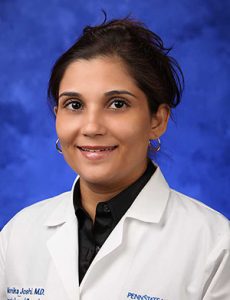June 12, 2020:
 Monika D. Joshi, MD, MRCP, associate professor of medicine at Penn State Cancer Institute, was recently appointed to represent Penn State on the Big Ten Cancer Research Consortium (Big Ten CRC) Steering Committee. The committee is composed of one researcher from each member institution and meets regularly to review activities of the consortium and decide matters of policy. The Steering Committee determines the criteria for approving concepts for development with the Big Ten CRC.
Monika D. Joshi, MD, MRCP, associate professor of medicine at Penn State Cancer Institute, was recently appointed to represent Penn State on the Big Ten Cancer Research Consortium (Big Ten CRC) Steering Committee. The committee is composed of one researcher from each member institution and meets regularly to review activities of the consortium and decide matters of policy. The Steering Committee determines the criteria for approving concepts for development with the Big Ten CRC.
Dr. Joshi, who specializes in genitourinary cancers, received her medical degree from Kasturba Medical College in India. She completed her residency in internal medicine at Pinnacle Health Hospitals and her fellowship in hematology/oncology at Milton S. Hershey Medical Center. She has been active in the Big Ten CRC since the consortium’s founding in 2013 and says she has gained valuable experience through her involvement in the Genitourinary Clinical Trial Working Group.
“As a young researcher, there is plenty of opportunity to learn from others, and I am very thankful for the guidance and expertise provided by all the GU researchers in the consortium. Their support has strengthened the scientific rationale and the kind of clinical studies that we are conducting,” she said.
In February, Dr. Joshi presented a poster on the Big Ten CRC study, BTCRC-GU15-023, during the 2020 Genitourinary Cancers Symposium. The study investigated whether the combination of radiation therapy and the checkpoint inhibitor durvalumab is safe and effective in advanced bladder cancer patients. Researchers reported the combination delivered promising efficacy, with a clinical response rate of 71.4% and a disease control rate of 95% in unresectable, cisplatin ineligible locally advanced bladder cancer.
“We are very fortunate to have an excellent team whose efforts made this study possible,” said Dr. Joshi, who is the sponsor-investigator of the study. “One of the key elements to make a team successful is that we have adequate participation and enthusiasm from all of the centers across the consortium.”
She recognizes this level of enthusiasm and engagement within the GU Clinical Trial Working Group, which she co-chairs along with David VanderWeele, MD, PhD, of the Robert H. Lurie Comprehensive Cancer Center of Northwestern University. “It matters when we all participate equally, and we want to give our best, and that is what our Big Ten CRC GU committee does,” she said.
Dr. Joshi said she is looking forward to supporting the consortium in her new role and identifying opportunities to tap into the resources available at her own institution.
“Penn State Cancer Institute has a lot going on in many disciplines, both in therapeutic and also in supportive and preventative aspects of cancer,” she said. “We have a lot of activity in supportive care, such as exercise and nutrition research, in addition to our key research programs. Dr. Kathryn H. Schmitz is the founding director of our Exercise Medicine Unit, and her research is focusing on the role of exercise in cancer patients.”
The Cancer Institute’s four scientific research programs include Cancer Virology and Immunology, Mechanisms of Carcinogenesis and Chemoprevention, Cancer Control and Population Health, and Experimental Therapeutics. Shared resources to facilitate research include biostatistics and bioinformatics, community outreach and engagement, flow cytometry, genomic sciences, metabolomics studies, and organic synthesis.
Dr. Joshi said she is eager to work with other members of the consortium to continue the Big Ten CRC’s growth, and she believes enthusiasm in collaboration will pave the way.
“We all have to be equally excited about anybody’s trial,” Dr. Joshi said. “We all are participants and investigators, even though we may not always be the lead investigator, we have a common goal of moving the field of research in cancer care. Each one of us is helping by enrolling patients on a trial that we developed together.”
About the Big Ten Cancer Research Consortium: The Big Ten Cancer Research Consortium was created in 2013 to transform the conduct of cancer research through collaborative, hypothesis-driven, highly translational oncology trials that leverage the scientific and clinical expertise of Big Ten universities. The goal of the Big Ten Cancer Research Consortium is to create a unique team-research culture to drive science rapidly from ideas to new approaches to cancer treatment. Within this innovative environment, today’s research leaders collaborate with and mentor the research leaders of tomorrow with the unified goal of improving the lives of all patients with cancer.
About the Big Ten Conference: The Big Ten Conference is an association of world-class universities whose member institutions share a common mission of research, graduate, professional and undergraduate teaching and public service. Founded in 1896, the Big Ten has sustained a comprehensive set of shared practices and policies that enforce the priority of academics in the lives of students competing in intercollegiate athletics and emphasize the values of integrity, fairness and competitiveness. The broad-based programs of the 14 Big Ten institutions will provide over $200 million in direct financial support to more than 9,800 students for more than 11,000 participation opportunities on 350 teams in 42 different sports. The Big Ten sponsors 28 official conference sports, 14 for men and 14 for women, including the addition of men’s ice hockey and men’s and women’s lacrosse since 2013. For more information, visit www.bigten.org.














Subscribe to the Big Ten CRC Newsletter X
X Facebook
Facebook YouTube
YouTube